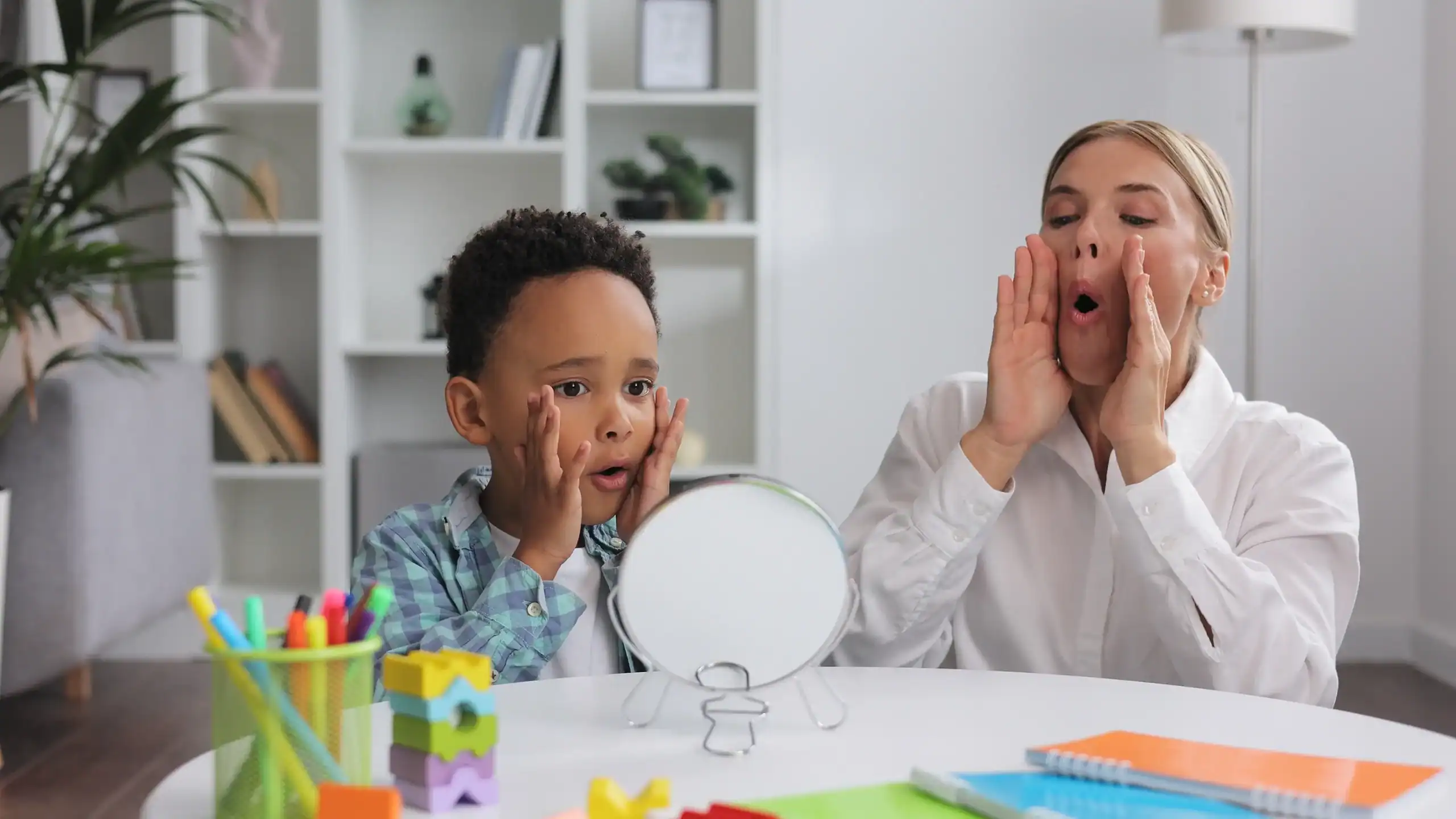
Does your child know what they want to say but have a hard time getting the words out? Do they struggle to form certain sounds or seem to work extra hard just to be understood?
Communication difficulties are common as children develop speech, and every child progresses at their own pace. However, if your child often shows the signs mentioned above and their speech isn’t improving with age, it may be a sign of childhood apraxia of speech, a neurological disorder that disrupts the connection between what your child’s brain wants to say and their ability to move their mouth to say it.
The good news is that with expert diagnosis and treatment from a pediatric speech-language pathologist, along with consistent practice at home, a child with apraxia can learn to speak clearly and confidently.
What Is Childhood Apraxia of Speech?
Childhood apraxia of speech is a rare neurological motor speech disorder that makes it hard for the brain to organize and control the mouth movements needed for speech. Even though your child’s lips, tongue, and jaws are strong, they can’t seem to coordinate properly to form the right sounds. As a result, your child knows what they want to say, but their speech may come out incorrectly or inconsistently, which can lead to frustration and unclear communication.
There are many possible reasons why a child might have apraxia, such as genetic factors, neurological differences, or other developmental conditions, but in some cases, there is no identifiable cause at all.
With early diagnosis and therapy, your child can learn to communicate more clearly and confidently.
What Are the Signs of Childhood Apraxia of Speech?
Apraxia can sometimes be mistaken for a more common speech delay because of overlapping symptoms. If your child shows several of the following signs, it’s important to get an evaluation from a qualified speech-language pathologist.
Signs to watch for include:
- Using fewer consonant and vowel sounds than expected for their age
- Pausing or stumbling between syllables or words
- Distorting vowel sounds
- Using equal emphasis on all syllables instead of a natural rhythm
- Having difficulty saying simple words properly
- Moving their mouth awkwardly as they try to say a word
- Making inconsistent errors when saying the same word
How Speech Therapy Helps Children with Apraxia of Speech
Speech therapy isn’t just helpful for apraxia, it’s essential. Because childhood apraxia of speech affects how the brain plans and sequences speech movements, your child needs professional guidance to retrain those motor pathways.
It’s important to know that apraxia can sometimes be missed or misdiagnosed by general practitioners, pediatricians, or neurologists. A speech-language pathologist is the specialist who’s trained to identify and treat apraxia. While progress can take time, with the right support from a qualified therapist, your child can learn to communicate clearly and confidently, showing that steady, consistent practice truly makes a difference.
What Speech Therapy Looks Like for Children with Apraxia of Speech
Your child’s speech-language pathologist will design a therapy plan tailored to their specific needs. While every program looks a little different, most apraxia treatment approaches include the following key elements:
- High repetition: Practicing key words and sounds many times to strengthen accurate motor patterns
- Multi-sensory feedback: Using visual, verbal, and tactile cues to help your child feel and hear how correct speech movements should sound
- Individualized goals: Choosing target words to master that are meaningful and functional, such as a favorite toy, sibling’s name, or part of a daily routine
- Frequent sessions: Scheduling short, consistent sessions that build skills more effectively than occasional long ones
- Parent involvement: Coaching caregivers on how to practice target words and cues at home to reinforce progress
- Progress tracking: Monitoring gains in clarity, consistency, and confidence over time
Over time, you’ll start to see your child gain confidence as communication becomes easier. With consistency, encouragement, and collaboration between you and your child’s speech-language pathologist, each new sound or word becomes a building block toward clear, confident speech.
Ways to Support Your Child at Home
Working with your child between sessions is just as important as their time with the speech-language pathologist. The more you reinforce what they’re learning in treatment, the faster they’ll move forward. Here are some simple ways to build speech work into your daily routine:
- Focusing on target words in short, playful bursts: Use target words from therapy during everyday moments, like playtime or mealtime. Frequent repetition in natural settings helps new speech patterns take hold.
- Modeling slow, clear speech: Speak calmly and clearly so your child can see and hear how words are formed. Slightly exaggerating your mouth movements makes it easier for them to imitate.
- Celebrating effort and persistence: Praise attempts, not perfection. Saying, “I love how you tried that sound!” encourages your child to keep going.
- Using gestures or visuals to support speech: If your child struggles to say a word, encourage them to use a simple sign, picture, or gesture instead. This reduces frustration and keeps them engaged while they keep learning to say the word aloud.
- Letting your child take the lead: Invite them to choose the words or games you use together. When your child feels in control, they stay more motivated and enjoy the process as a shared experience rather than a chore.
By weaving speech work into daily life, you’re helping your child build strong communication skills that grow over time, one word at a time.
Reach Out to Peninsula Associates Speech Therapy Services for Support
If you’re concerned your child is showing signs of apraxia, Peninsula Associates Speech Therapy Services is here to help. Since 1978, our experienced and compassionate team has provided personalized care for children and adults across the Bay Area. We work closely with families, educators, and healthcare providers to support steady progress and lasting results.
Call us today at (650) 709-9780 to schedule an evaluation or speak with a speech language pathologist who specializes in apraxia. Together, we’ll help your child build clear, confident communication skills that last a lifetime.

